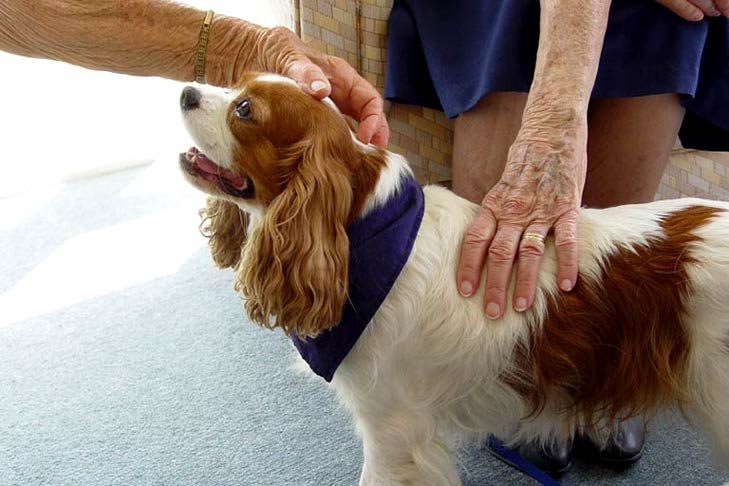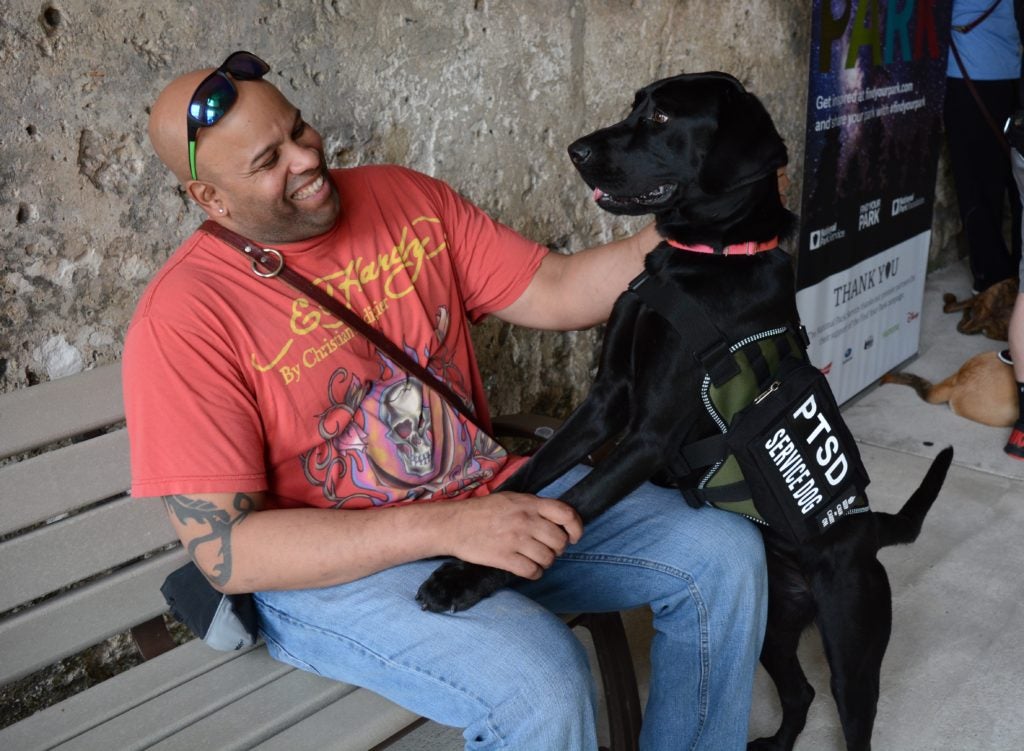what tasks are emotiinal support animals trained to do
Dogs accept been aiding and working with humans since aboriginal times, in everything from farming to hunting to protection and more. Service dogs, working dogs, therapy dogs, and emotional back up animals all fulfill of import roles in their assistance to humans, but the terms are not interchangeable. Each recognization is specifically defined, both in terms of the jobs undertaken and the legals rights offered.
What Do Service Dogs Practise?
As defined by the Americans with Disabilities Human action (ADA), service dogs are individually trained to perform specific tasks and to work with people with disabilities. According to the ADA, disabilities can be "physical, sensory, psychiatric, intellectual, or other mental inability." The work of the service dog must be directly related to the handler's disability. These are merely some of the things a service dog can practise:
- Guide dogs assist blind people navigate in the world.
- Hearing (or signal) dogs alarm deaf people to sounds, such equally a knock on the door or a person entering the room.
- Psychiatric dogs are trained to find and lessen the effects of a psychiatric episode.
- Service dogs assistance those in wheelchairs or who are otherwise physically limited. They may open doors or cabinets, fetch things their handler tin can't reach, and behave items for their handler.
- Autism assistance dogs are trained to help those on the autism spectrum to distinguish important sensory signals, such every bit a fume alarm, from other sensory input. They may also alert their handler to repetitive behaviors or overstimulation.
- Service dogs that are trained to recognize seizures and volition stand guard over their handler during a seizure or get for help.
What Rights Do Service Dog Owners Take?
The ADA mandates that service dogs take full public access rights, which means they are allowed to go places where are animals are forbidden. They tin exist brought into restaurants, stores, libraries, and other public spaces. They must be permitted in housing, even if other pets are not immune. Service dogs are also immune on airplanes and other public transport. One caveat: each airline has its own rules regarding service dogs. Nigh require that the dog sits on the traveler'southward lap or at their anxiety. Dogs cannot block the alley or sit in the emergency exit row. Service dogs are exempt from the pet fees that airlines charge.
What is a Working Dog?
A working dog is a purpose-trained canine that learns and performs tasks to assist its human companions. Detection, herding, hunting, search and rescue, police, and military dogs are all examples of working dogs. Working dogs often rely on their excellent senses of smell to help out where humans fall short. But a few of the jobs performed by working dogs include:
- Search and rescue. From missing persons cases to natural disasters, dogs take been an integral part in finding people in dire situations. Search and rescue (SAR) dogs tin can either apply a scent in the air or the smell of a specific object to detect who they're looking for. They can be used in many dissimilar situations, including disasters, cadaver searches, drowning situations, and avalanches. Bloodhounds are widely used in this role.
- Explosives detection. These canine heroes work with the law, Transportation Security Assistants (TSA), and military to locate dangerous materials. The dogs get through an intense grooming course to learn how to locate and identify a wide diversity of explosives and to alert their handlers of its presence. Breeds that excel in this kind of work include the German Shepherd and Belgian Malinois.
- Cancer detection. Believe it or non, scientists were able to train Labrador Retrievers to sniff out cancer in patients' breath past smelling samples and sitting downward in front of the ane that was malignant. Cancer cells give off dissimilar odors than regular cells and they change the way a person's breath smells– a dog's keen nose tin can tell the difference. In one example in particular, the Lab correctly diagnosed the disease 98 percent of the fourth dimension, whereas a exam that is ordinarily used establish the cancer merely ten percent of the time.
- Allergy alert dogs. These dogs are trained to detect the allergen and its residue at schools, social events, and everyday activities and alert their owner. Their grooming is similar to that of a law dog learning to rail scents or drugs. Breeds ordinarily trained as allergy alert dogs are the Poodle and the Portuguese Water Dog.
Since working dogs are unremarkably specifically trained to perform certain roles in certain locations, they are not oft subject to legal ramifications. When they are on the chore, withal, working dogs should not be approached or petted, every bit doing their job properly requires a high level of focus without distractions.
What is a Therapy Dog?
Therapy dogs play a different helping part than service dogs and emotional back up animals. They aren't trained to live with a specific handler. Rather, these are dogs that — with their homo teammate (oft the dog'south possessor) — volunteer in clinical settings, such as hospitals, mental health institutions, hospices, schools, and nursing homes, where they provide comfort, affection, and even love in the course of their work. Therapy dogs are trained to be comfortable in new environments and to interact with different people. They should have a calm temperament, exist unfazed by unfamiliar noises and movements, be comfortable being handled, and love people.
Practice Therapy Dogs Have Legal Rights?
Although they are defined every bit comfort dogs and oft used in therapeutic settings, therapy dogs are non considered service dogs under the ADA and don't take the same legal right to admission in public spaces. In that location are no uniform state or national rules that regulate and certify therapy dogs, and different organizations take unlike guidelines. As a general rule, therapy dogs should be trained, insured, and licensed by the non-profit that's offering their services.

Can My Dog Be a Therapy Dog?
If you're interested in volunteering and think your dog may be a nifty candidate to be a therapy dog, organizations like the Alliance of Therapy Dogs test dog for their suitability and, if accepted, accept guidelines that must exist followed.
While it doesn't certify therapy dogs, the AKC Canine Expert Denizen (CGC) program offers their training program to organizations, and the CGC examination is ofttimes a prerequisite required by therapy canis familiaris organizations.
What Do Emotional Support Animals (ESAs) Do?
Emotional back up dogs are non considered service dogs under the ADA. They may be trained for a specific owner, simply they are non trained for specific tasks or duties to assistance a person with a disability, and this is the chief departure betwixt ESAs and service dogs. This doesn't minimize the support these dogs provide for people with a psychological disorder. They're considered companion animals and ease feet, low, some phobias, and loneliness. In order to be considered an emotional back up dog, it must be prescribed past a mental health professional for a patient with a diagnosed psychological or emotional disorder, such as anxiety disorder, major low, or panic attacks.
What Rights Do Emotional Back up Animals Have?
Unlike service dogs owners, ESA owners accept only limited legal rights and those typically crave a alphabetic character of diagnosis from the possessor'due south doctor or psychiatrist. While they don't take unlimited admission to public spaces, the Fair Housing Act mandates "reasonable accommodations" for emotional support animals even in buildings that don't let pets. Equally of January 2021, airlines are no longer required to adapt emotional support animals.
Source: https://www.akc.org/expert-advice/training/service-working-therapy-emotional-support-dogs/

0 Response to "what tasks are emotiinal support animals trained to do"
Post a Comment